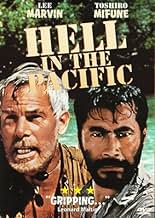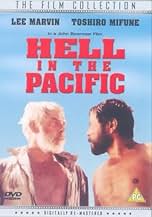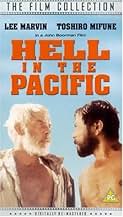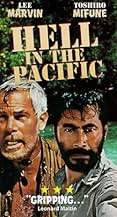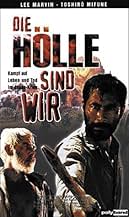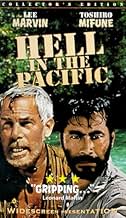Füge eine Handlung in deiner Sprache hinzuDuring World War II, an American pilot and a marooned Japanese navy captain are deserted on a small uninhabited island in the Pacific Ocean. There, they must cease their hostility and cooper... Alles lesenDuring World War II, an American pilot and a marooned Japanese navy captain are deserted on a small uninhabited island in the Pacific Ocean. There, they must cease their hostility and cooperate if they want to survive, but will they?During World War II, an American pilot and a marooned Japanese navy captain are deserted on a small uninhabited island in the Pacific Ocean. There, they must cease their hostility and cooperate if they want to survive, but will they?
- Regie
- Drehbuch
- Hauptbesetzung
- Auszeichnungen
- 1 Gewinn & 2 Nominierungen insgesamt
- Captain Tsuruhiko Kuroda
- (as Toshiro Mifune)
Empfohlene Bewertungen
This is a rare work of film that uses two actors, limited dialog(half of it in Japanese), and only one location. There have been many attempts at making movies about people stranded on islands, but this one pulls it off in a way no other has.
Thsi is a film about not only survival, but overcoming prejudice towards ones sworn enemy in a time of war. It is about moving past the fears of what you do not know, and using what you do know and the basic need to survive to pull through and band together.
I was more enthralled by this movie with almost no dialog, than I have been with movies that have won screenplay Oscars. To me, this is an example that if you have the right actors, the right story, and the right setting, dialog is not always necessary.
Ignoring the ridiculously abrupt ending, Hell in the Pacific is excellent in its structure. Considering that the target audience is going to be English-speaking (although the experience would not be too diminished for a Japanese audience) the story is told in the beginning from the perspective of the Japanese man. The American character is a mere presence amid the trees, and the fact that we can understand him is of little consequence because he doesn't say much of relevance. The Toshiro Mifune character is more loquacious, even though most viewers won't know what he's saying, and Lee Marvin's relative quietness emphasises the wordless savagery of the first half. It's only as the picture progresses and the men become more amiable towards each that they become recognisably human characters. But even this is done more through imagery than words, giving us an equally good impression of the two of them despite the language barrier.
This telling from the Japanese point-of-view is also reinforced in the methods of director John Boorman, who often makes the camera Mifune's eyes or keeps him up front while Marvin lurks in the background. Other than that, Boorman's style as a director is like a love letter to Akira Kurosawa and Sergio Leone, the latter especially. He gives us gnarly close-ups, a dynamic rhythm and eye-catching tableaux such as the shot of Marvin and Mifune as they arrive on the second island, like statues about to leap into action. It is all very overtly stylised, but it is a pretty neat way of keeping this story of such simple elements constantly interesting and engaging.
Toshiro Mifune is well-known to even the most casual of foreign cinema buffs, being the favourite star of the aforementioned Kurosawa. It's nice to see him used well in this less familiar context. The only other non-Japanese picture I have seen him in is a bizarre British-made Western called Red Sun, which is incidentally one of the worst films I have ever seen. You notice, seeing him here opposite Lee Marvin, he is not a tall man, but he makes up for this with his strong presence and irascible energy. But it's not all about the rage. I like here his passively bemused responses when Marvin is ranting at him. Lee Marvin shows his easy capacity for turning a serious-sounding performance into something surprisingly comical, such as his acting out of throwing the stick and picking it up.
Appropriately for a movie of few words, music plays a big part in Hell in the Pacific. The Lalo Schifrin score is by turns haunting, playful, and sometimes teasingly melodramatic. It is an unusually big score for a movie that is otherwise so minimalist, but its constant variation and inventiveness suits the action very well. And, aside from the power of its message, this is part of what makes Hell in the Pacific so appealing. It is all of a piece, a mesmerising tone poem on a the fate of humanity.
Does war extend to the individual? Trained to kill or be killed, two adversaries face off. Each with his own fear that the other will succeed. Why didn't they kill each other when they had the chance? Because man is a social animal and he needs the company of others. To use a cliché - No man is an island.
And in the end conflict erupts. Not because of any innate difference between the two men - but because of how they define themselves in a greater scene. I am Japanese - you are American (and vice versa). Throw in the element of non-communication (neither spoke any of the other's language) and you have it.
Two great actors, a great script, a grand theme.
If you are one of the producers responsible for this theatrical release ending and are somehow still alive and reading this I can only ask WTF were you smoking? We invested two hours into the relationship between Marvin & Mifune for that??? It may be the worst ending I've ever witnessed in a decent movie. On the bright side for you, I may keep the blu ray for that reason alone!
Wusstest du schon
- WissenswertesBoth Lee Marvin and Toshirô Mifune actually served in the Pacific during World War II, of course on opposing sides. Marvin was a US Marine. He was wounded during the war and received the Purple Heart during the Battle of Saipan in 1944. Mifune served in the Imperial Japanese Army Air Service.
- PatzerLee Marvin was 44 at the time of filming, as evident by his gray hair. Toshiro Mifune's character also calls him an "old man" several times. WWII US Navy pilots Thus, he looks much too old for an actual WWII US Navy pilot, who were mostly in their twenties or early thirties.
- Zitate
American Pilot: Oh, for a second I thought you were a Jap.
- Alternative VersionenAmerican version featured an alternative ending where the two get drunk and walk off in separate directions arguing at each other; in the British version (which was exactly the same as the Japanese version), they start yelling and a bomb from the sky falls and blows everything apart.
- VerbindungenFeatured in Hollywood Remembers Lee Marvin (2000)
Top-Auswahl
- How long is Hell in the Pacific?Powered by Alexa
Details
Box Office
- Budget
- 4.150.000 $ (geschätzt)
- Laufzeit
- 1 Std. 43 Min.(103 min)
- Seitenverhältnis
- 2.35 : 1


